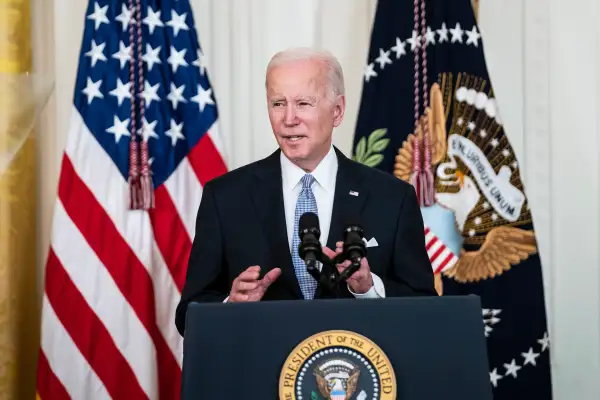'Top Economic Challenge Right Now': How Biden Plans on Fighting Inflation

The Biden administration is changing its tune on inflation: Treasury Secretary Janet Yellen now says that she was "wrong" about how long high inflation would last, and President Biden himself called inflation the country's "top economic challenge" while announcing plans to tackle rising prices.
CNN’s Wolf Blitzer interviewed Secretary Yellen on Tuesday and played for her a montage of clips from last year, in which Yellen said there was a “small risk” of inflation and that it would be “manageable” for the U.S. economy. Blitzer asked Yellen if she was wrong in this assessment.
“Look, I think I was wrong then about the path that inflation would take,” she responded, noting that there were large economic shocks that affected food and energy prices that she didn’t anticipate.
Yellen’s comments came directly after she met with President Joe Biden and Federal Reserve Chairman Jerome Powell in the Oval Office, where they coordinated their efforts to tackle inflation.
Last year, both Powell and Yellen referred to inflation as “transitory,” aka temporary. Now, with inflation above 8% in both March and April — a level unseen since the 1980s — the Biden administration is shifting gears. It is publicly laying out a game plan to combat soaring prices, while also stating its powers are limited.
What is Biden's plan to lower inflation?
In an op-ed published by the Wall Street Journal over the Memorial Day weekend, Biden called inflation the country’s “top economic challenge right now,” echoing what many Americans have been saying for months.
Recent polls show that Americans not only think inflation is the top economic concern for the U.S. — but the biggest problem facing the nation in general.
Over the past few months, as inflation lingers at near-four-decade highs, Americans' views of the economy have only soured. A new Gallup poll released Tuesday shows that 46% of Americans say current economic conditions are “poor,” and 77% say they’re only getting worse.
What’s more, Gallup’s poll shows that a new factor dethroned inflation as the most important problem facing the country: the government’s poor leadership.
Biden addressed growing economic fears and uncertainty in the op-ed, framing them against a backdrop of strong economic gains since the height of the pandemic and a red-hot labor market.
“With the right policies,” Biden wrote, “the U.S. can transition from recovery to stable, steady growth and bring down inflation without giving up all these historic gains.”
More specifically, he laid out his three-part plan to get inflation under control:
- Getting out of the Federal Reserve’s way: The U.S.’s central banking system, aka the Fed, is primarily tasked with getting inflation under control. Chairman Powell has indicated he would do whatever it takes to accomplish that — even if that comes at the expense of the labor market. The Fed has two main levers to pull to ease inflation: raising interest rates and shrinking its $9 trillion bond portfolio. The agency is currently pulling both of them.
- Lowering costs for families: One of the biggest price shocks to Americans’ budget comes from gas. The national average price for a gallon of gas on Thursday is $4.72, according to AAA. That's the highest gas prices have ever been and about $1.68 more than it was a year ago. Biden pointed to recent actions he took to coordinate the largest release of oil from global reserves to help bring down prices. At the same time, he has sanctioned Russian oil companies, a move that he acknowledged would result in higher prices at the pump. Biden also mentioned proposals for reducing the costs of housing, prescription drugs and child care, but said Congress would need to act.
- Reducing the federal deficit even further: In 2020, the federal deficit hit a record-high $3.1 trillion. A deficit happens when the government essentially spends more money than it brings in. In 2021, the deficit crept below $2.8 trillion, the second highest it’s ever been. But in 2022, as Biden noted, the deficit is on track to plummet to $1 trillion, according to the nonpartisan Congressional Budget Office. Biden says his economic policies fast-tracked the U.S. economy’s recovery, ultimately raising government revenues and decreasing the deficit. He wants to reduce the deficit even further by collecting more taxes from billionaires and corporations, though this also depends on Congressional approval.
If Biden’s agenda makes one thing clear, it’s that the president alone can’t solve inflation.
"We can't take immediate action that I'm aware of yet to figure out how we're bringing down the prices of gasoline back to $3 a gallon," Biden said in a meeting with White House officials and manufacturers Wednesday. "And we can't do that immediately with regard to food prices either."
After all, monetary policy is the Federal Reserve’s domain, but the Fed's capacity to tackle inflation is also limited. Chairman Powell said in a May press conference that the Fed is essentially fighting inflation with “blunt tools” that are “not capable of surgical precision.”
Currently, the Fed is hiking interest rates to lower consumer demand, but if it raises rates too quickly, it risks sending the U.S. into another recession. That’s only part of the equation, of course, as global supply-chain issues are considered a major contributor to current inflation levels.
To address many of the supply-chain issues, Biden will need help, both from international trade partners and Congress. And he knows it.
“I will work with anyone — Democrat, Republican, or independent — willing to have an open and honest discussion that delivers real solutions for the American people,” Biden wrote.
More from Money:
4 Best Money Moves for June 2022
America's Corporate Monopolies Make Inflation Worse: Fed Report
96% of Top Economists Expect the U.S. to Have High Inflation for the Rest of 2022
